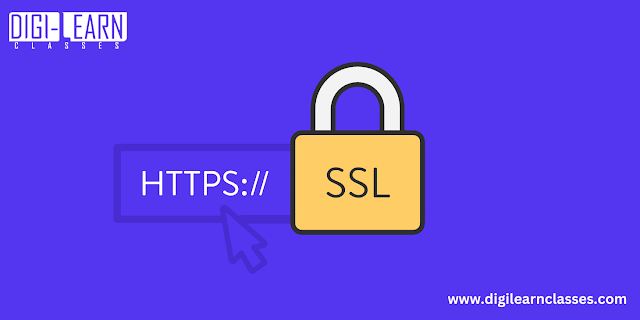The SEO Benefits of Having an SSL Certificate:
In the digital age, cybersecurity is a paramount concern, and Google is committed to ensuring user safety and privacy. As part of their efforts, they’ve made SSL certificates a significant factor in search engine optimization (SEO). SSL (Secure Sockets Layer) certificates, indicated by the “https” in website URLs and the padlock symbol in browsers, are not only essential for security but also offer several SEO benefits. In this comprehensive guide, we’ll delve into the advantages of having an SSL certificate for SEO.
Understanding SSL Certificates
Before we dive into the SEO benefits, let’s briefly understand what SSL certificates are and how they work:
SSL Certificate: An SSL certificate is a digital certificate that authenticates the identity of a website and encrypts data transmitted between the user’s browser and the website’s server. This encryption ensures that sensitive information, such as login credentials or credit card details, remains private and secure.
HTTPS: Websites with SSL certificates use HTTPS (Hyper Text Transfer Protocol Secure) instead of HTTP. HTTPS encrypts data in transit, preventing unauthorized access and data breaches.
Here’s how SSL certificates work:
1. Authentication: When a user visits an HTTPS website, their browser requests the website’s SSL certificate. The browser then verifies the certificate’s authenticity with a trusted Certificate Authority (CA).
2. Encryption: Once the certificate is verified, a secure connection is established between the user’s browser and the website’s server. All data exchanged between them is encrypted, making it unreadable to anyone trying to intercept it.
3. Trust: Browsers display visual cues like a padlock symbol or a green address bar to indicate that the connection is secure. This builds trust with users and assures them that their data is safe.
SEO Benefits of Having an SSL Certificate
1. Improved Ranking on Search Engines:
Google considers HTTPS a ranking signal, albeit a relatively minor one. Websites with SSL certificates may receive a slight SEO boost in search engine rankings. While this boost alone may not propel your site to the top, every advantage counts in the competitive world of SEO.
2. Enhanced User Trust:
Users are becoming increasingly cautious about their online security and privacy. When they see the padlock symbol and “https” in the address bar, it instills confidence that your website is secure. This trust can lead to longer session durations, lower bounce rates, and more conversions—all of which positively influence SEO.
3. Data Integrity and Privacy:
SSL certificates encrypt data transmitted between the user’s browser and your website’s server. This encryption ensures that sensitive information remains confidential and intact. Protecting user data is not only a legal requirement in many jurisdictions but also a significant trust factor for visitors to your site.
4. Referral Data Preservation:
Without an SSL certificate, referral data (the source of your website traffic) can be hidden when visitors click on links from secure (HTTPS) websites to non-secure (HTTP) websites. This can result in a loss of valuable information for SEO analysis. HTTPS websites retain referral data, providing insights into your traffic sources.
5. Reduction in Security Warnings:
Browsers like Google Chrome actively warn users when they visit non-secure HTTP websites, potentially scaring them away. With an SSL certificate, your site won’t trigger these security warnings, helping to retain visitors and maintain a positive user experience.
6. Mobile Optimization:
Google’s mobile-first indexing means that it primarily uses the mobile version of a website for ranking and indexing. Having an SSL certificate is especially important for mobile SEO, as it ensures that the mobile experience is secure and user-friendly.
7. Compliance with Best Practices:
Google and other search engines continually encourage best practices for web development and security. Having an SSL certificate aligns with these recommendations, demonstrating your commitment to following industry standards, which can positively affect your website’s reputation in the eyes of search engines.
How to Get an SSL Certificate
Getting an SSL certificate for your website is a straightforward process. Here are the general steps to follow:
1. Choose the Right Type:
There are various types of SSL certificates available, including domain-validated (DV), organization-validated (OV), and extended validation (EV) certificates. The level of validation and features vary. For most websites, a DV certificate is sufficient.
2. Purchase a Certificate:
You can obtain an SSL certificate from a Certificate Authority (CA). Many web hosting providers also offer SSL certificates as part of their hosting packages. Compare options and prices to choose the best fit for your needs.
3. Generate a Certificate Signing Request (CSR):
You’ll need to generate a CSR from your web server or hosting control panel. This request contains information about your website and server and is used to create the SSL certificate.
4. Submit the CSR to the CA:
Submit your CSR to the CA along with any required documentation. The CA will then validate your domain and issue the SSL certificate.
5. Install the Certificate:
Once you receive the SSL certificate from the CA, you’ll need to install it on your web server. This process varies depending on your server software. Your hosting provider may assist with the installation.
6. Update Your Website:
Update your website’s configuration to use HTTPS. Ensure that all internal links and resources (like images, stylesheets, and scripts) use HTTPS rather than HTTP.
7. Test and Verify:
Test your website thoroughly to ensure that SSL is correctly configured, and there are no mixed content issues (where some elements load over HTTP instead of HTTPS).
8. Monitor and Renew:
Regularly monitor your SSL certificate’s expiration date and renew it before it expires to maintain uninterrupted HTTPS access.
Common SSL Mistakes to Avoid
While SSL certificates are a valuable addition to your SEO arsenal, there are some common mistakes to avoid:
1. Mixed Content: Ensure that all elements on your website, including images, scripts, and stylesheets, are loaded securely via HTTPS. Mixed content (where some elements load over HTTP) can trigger security warnings and negatively impact SEO.
2. Incorrect 301 Redirects: If you’re migrating from HTTP to HTTPS, use 301 redirects to ensure that old HTTP URLs redirect to their corresponding HTTPS versions. This preserves your SEO rankings and avoids duplicate content issues.
3. Losing Backlinks: When migrating to HTTPS, update your disavow file and reach out to websites linking to your HTTP pages, requesting that they update their links to HTTPS versions.
4. Not Updating Internal Links: Update all internal links on your website to point to the HTTPS version of your pages. Neglecting this step can lead to mixed content issues.
5. Ignoring Mobile Compatibility: Ensure that your SSL certificate and HTTPS setup are mobile-friendly, as Google’s mobile-first indexing places importance on the mobile user experience.

Conclusion:
An SSL certificate is more than just a security measure; it’s a valuable asset for your SEO efforts. It enhances user trust, preserves referral data, and aligns with Google’s best practices. As the online landscape continues to prioritize security and privacy, having an SSL certificate isn’t just an option—it’s a necessity. By making the switch to HTTPS, you’re not only safeguarding your users’ data but also giving your website a competitive edge in the ever-evolving world of SEO.



